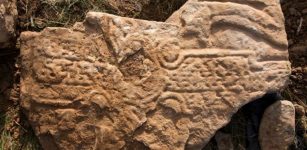Echo And Narcissus: Cursed Ability To Speak And Punishment Of Selfish Love And Vanity
A. Sutherland - AncientPages.com - It is a literary work that has inspired numerous works of art through the centuries and is considered one of the most touching stories ever written.
Due to this beautiful story, we learn the meaning behind the word 'Echo' that originates in the Greek myth about a mountain nymph whose ability to speak was cursed, leaving her able only to repeat the last words spoken to her.
To this day, Echo's voice is heard from labyrinths, caves, the walls of forests, mountain slopes, rocks, and ravines, according to an ancient belief.
This myth tells a story of punishment for rejecting love and boundless selfishness and self-admiration that hurts. It even speaks about misdirected and unfulfilled love.
According to Ovid, one of the great ancient Roman poets, Zeus gave the mountain nymph Echo the task of entertaining and distracting his wife, Hera and keeping her from discovering his erotic escapades.
Friendly and fun-loving individual, Echo was a favorite friend of Artemis.
This is a preview of our premium article available only to members of Ancient Pages.
Become a member to read more - Click here
If you are already a member and have logged in to your account, you can access the article here
See also:
The Curse Fell On King Midas And His Gold Desire Became A Nightmare
Tane: Lord Of The Forest Who Brought Three Baskets Of Knowledge To People In Maori Mythology
Miraculous Cauldrons Of The Ancient Celtic World
Explore also: Ancient Pages Library of Ancient and Unexplained Mysteries
More From Ancient Pages
-
 Arrow Pre-Dating The Vikings Discovered After Being Lost In The Ice For 1,500 Years
Archaeology | Aug 25, 2022
Arrow Pre-Dating The Vikings Discovered After Being Lost In The Ice For 1,500 Years
Archaeology | Aug 25, 2022 -
 1,200-Year-Old Viking Sword Found By Hiker In Norway
Archaeology | Oct 22, 2015
1,200-Year-Old Viking Sword Found By Hiker In Norway
Archaeology | Oct 22, 2015 -
 Xibalba: Nine-Leveled Underground Place Of Fear Ruled By Lords Of Death In Maya Beliefs
Featured Stories | May 12, 2020
Xibalba: Nine-Leveled Underground Place Of Fear Ruled By Lords Of Death In Maya Beliefs
Featured Stories | May 12, 2020 -
 Secrets Of Legendary Viking Crystal Sunstones And The Mysterious Uunartoq Artifact Unraveled
Artifacts | Jun 3, 2015
Secrets Of Legendary Viking Crystal Sunstones And The Mysterious Uunartoq Artifact Unraveled
Artifacts | Jun 3, 2015 -
 Mysterious Mermaid Mummy Investigated By Scientists
News | Feb 22, 2022
Mysterious Mermaid Mummy Investigated By Scientists
News | Feb 22, 2022 -
 Unknown Ancient Structures Discovered At Machu Picchu By LIDAR
Archaeology | Mar 29, 2022
Unknown Ancient Structures Discovered At Machu Picchu By LIDAR
Archaeology | Mar 29, 2022 -
 Ancient Mexicans’ Precise Solar Observations Fed Millions – Remarkable Farming Calendar Invented
Archaeoastronomy | Dec 12, 2022
Ancient Mexicans’ Precise Solar Observations Fed Millions – Remarkable Farming Calendar Invented
Archaeoastronomy | Dec 12, 2022 -
 Discovered Near Arctic: Mysterious Lost Medieval Civilization And Puzzling Ancient Mummy
Archaeology | Jul 4, 2015
Discovered Near Arctic: Mysterious Lost Medieval Civilization And Puzzling Ancient Mummy
Archaeology | Jul 4, 2015 -
 Bad King John’s Lost Treasure May Be Hidden Near The Walpole Marsh In The Fenlands – Archaeologists Say
Archaeology | Mar 27, 2024
Bad King John’s Lost Treasure May Be Hidden Near The Walpole Marsh In The Fenlands – Archaeologists Say
Archaeology | Mar 27, 2024 -
 Ancient Syriac Epitaphs Discovered In Tomb Of Priest Monoha Shed New Light On The Assyrian Empire
Archaeology | Dec 23, 2019
Ancient Syriac Epitaphs Discovered In Tomb Of Priest Monoha Shed New Light On The Assyrian Empire
Archaeology | Dec 23, 2019 -
 Enigmatic Stones Of The Picts: Orkney’s Unique Stone With Dragon-Like Creature And Cross Carving
Civilizations | Oct 19, 2018
Enigmatic Stones Of The Picts: Orkney’s Unique Stone With Dragon-Like Creature And Cross Carving
Civilizations | Oct 19, 2018 -
 LIDAR Discovers 18-Kilometer (11-Mile) Maya Road In The Yucatan Jungle
Archaeology | Dec 5, 2023
LIDAR Discovers 18-Kilometer (11-Mile) Maya Road In The Yucatan Jungle
Archaeology | Dec 5, 2023 -
 Ancient Maya Destroyed Their Environment 2,000 Years Ago – Effects Are Still Visible Today
Civilizations | Sep 9, 2015
Ancient Maya Destroyed Their Environment 2,000 Years Ago – Effects Are Still Visible Today
Civilizations | Sep 9, 2015 -
 Morrígan: Shape-Shifting Phantom Queen And Her Meeting With Irish Hero Cuchulainn
Celtic Mythology | Aug 7, 2017
Morrígan: Shape-Shifting Phantom Queen And Her Meeting With Irish Hero Cuchulainn
Celtic Mythology | Aug 7, 2017 -
 Nastrond (Náströnd): Grisly Hall Of Corpses – Norse Vision Of Most Terrible Place In Niflheim, Kingdom Of The Dead
Featured Stories | Sep 13, 2019
Nastrond (Náströnd): Grisly Hall Of Corpses – Norse Vision Of Most Terrible Place In Niflheim, Kingdom Of The Dead
Featured Stories | Sep 13, 2019 -
 Roman Leather Toy Mouse Found At Vindolanda
Archaeology | Jun 6, 2023
Roman Leather Toy Mouse Found At Vindolanda
Archaeology | Jun 6, 2023 -
 How Did A Rare 2,000-Year-Old Gem Seal Depicting God Apollo End Up In The City Of David?
Archaeology | Nov 5, 2020
How Did A Rare 2,000-Year-Old Gem Seal Depicting God Apollo End Up In The City Of David?
Archaeology | Nov 5, 2020 -
 Little Known History Of Amazon’s Ashaninka People Studied By Researchers
Archaeology | Mar 21, 2023
Little Known History Of Amazon’s Ashaninka People Studied By Researchers
Archaeology | Mar 21, 2023 -
 Ancient People In Tasmania Witnessed Stunning Auroras When The Earth’s Magnetic Field Flipped
News | Feb 19, 2021
Ancient People In Tasmania Witnessed Stunning Auroras When The Earth’s Magnetic Field Flipped
News | Feb 19, 2021 -
 Study Of Ancient Skulls Sheds Light On Human Interbreeding With Neandertals
Archaeology | Aug 23, 2022
Study Of Ancient Skulls Sheds Light On Human Interbreeding With Neandertals
Archaeology | Aug 23, 2022



